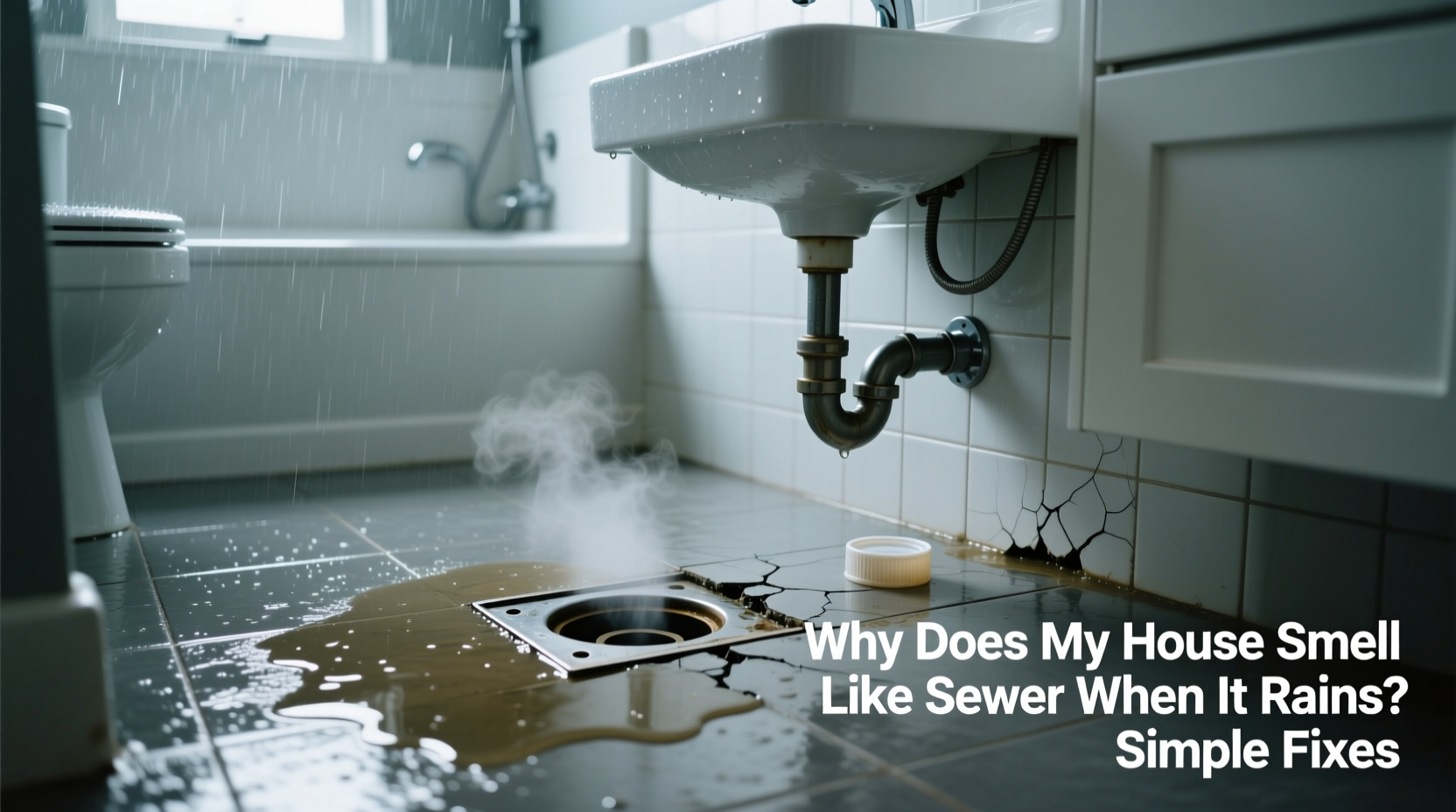There’s something unsettling about walking into your home during or after a heavy rain and being greeted by a pungent, rotten-egg-like odor. It’s unmistakable—the stench of sewer gas creeping up through drains or floor vents. While occasional drain smells can happen, a pattern tied specifically to rainfall suggests an underlying plumbing issue that needs attention. The good news? Most causes are fixable without major renovations or expensive repairs.
Sewer gas is not only unpleasant—it can also pose health risks if inhaled over long periods. Hydrogen sulfide, the primary component responsible for the rotten egg smell, can cause headaches, nausea, and respiratory irritation at high concentrations. Addressing the root cause quickly protects both your comfort and well-being.
How Rain Triggers Sewer Smells in Your Home

Rain doesn’t create sewer gas—but it can activate conditions that allow it to enter your home. Under normal circumstances, plumbing systems use water-filled traps and vent pipes to safely channel gases outside through roof vents. When rain disrupts this balance, pressure changes or blockages may force those gases back indoors.
Heavy downpours saturate the ground, increasing moisture around underground sewer lines and septic tanks. This saturation can:
- Displace soil around pipes, leading to shifting or cracking.
- Increase pressure inside sewer lines due to groundwater infiltration.
- Flood dry trap seals in floor drains located in basements or utility rooms.
- Cause backflow if municipal sewers become overwhelmed (especially in older cities).
Additionally, strong winds accompanying storms can alter air pressure around vent stacks on your roof, temporarily reversing airflow and pulling odors downward instead of releasing them upward.
Common Causes and How to Diagnose Them
Before attempting any fix, identify where the odor originates. Walk through each room slowly—kitchens, bathrooms, laundry areas, and basements are typical hotspots. Listen for gurgling drains, check for visible cracks, and inspect floor-level grates.
1. Dry P-Traps in Floor Drains
Floor drains in basements, garages, or laundry rooms often go unused for weeks or months. Their P-traps rely on standing water to form a seal against sewer gases. During dry spells, this water evaporates. Rain increases humidity and atmospheric pressure, which can then push gases past the now-broken seal.
Test: Pour half a cup of water into any floor drain. Wait 15 minutes. If the smell diminishes or disappears, you’ve likely solved the issue.
2. Blocked or Improperly Installed Vent Pipes
Every plumbing fixture connects to a vent pipe that extends through the roof. These vents equalize pressure and allow gases to escape safely. Leaves, bird nests, snow, or even ice can block these openings, especially after stormy weather.
A blocked vent creates negative pressure, siphoning water out of traps and allowing sewer gas to backflow into your home.
“Vent stack obstructions are one of the most overlooked sources of post-rain sewer odors. A quick rooftop inspection can prevent costly misunderstandings.” — Marcus Tran, Master Plumber & Plumbing Instructor
3. Cracked or Collapsed Drain Lines
Older clay or cast iron pipes degrade over time. Tree roots, shifting soil, or age-related corrosion can cause cracks or partial collapses. When it rains, saturated soil presses against compromised lines, forcing gases into surrounding areas—including crawlspaces or basement walls.
If the smell seems to come from walls or corners—not just near drains—this could indicate a hidden breach in the main sewer line.
4. Sewer Backup Due to Municipal Overflow
In neighborhoods with combined stormwater and sanitary sewers, heavy rains can overwhelm treatment plants. This leads to backups where wastewater—and its associated gases—can rise into homes through low-point fixtures like basement toilets or showers.
This is more common in older urban areas and usually coincides with widespread local flooding reports.
5. Failed Wax Ring Under Toilets
The wax ring between your toilet base and the floor flange creates a tight seal around the drain. Over time, it can deteriorate, crack, or shift—especially if the toilet rocks even slightly. Rain-induced ground swelling can worsen such gaps, letting gases escape near the bathroom floor.
Check: Gently rock the toilet side-to-side. Any movement indicates a potential seal failure.
Simple Fixes You Can Do Yourself
Many causes of rain-related sewer smells require no professional help. Start with these straightforward solutions before calling a plumber.
Step-by-Step: Replenish Dry Traps
- Locate all floor drains (basement, garage, utility room).
- Pour ½ to 1 gallon of clean water into each drain.
- Add a small amount of dish soap to help sanitize the pipe and reduce surface tension.
- Repeat monthly—or every two weeks in dry climates—to maintain the seal.
Clean Roof Vents Safely
- Access your roof safely using a sturdy ladder and proper footwear.
- Inspect vent pipes (typically 2–4 inch diameter PVC tubes rising above the roofline).
- Remove debris like leaves, pine needles, or bird nests by hand or with a garden trowel.
- Flush the vent with a garden hose for 30 seconds to clear internal buildup.
- Listen at indoor drains for gurgling—if heard, the vent may still be partially clogged.
For stubborn clogs deeper in the system, consider using a plumber’s snake fed down the vent opening.
Replace a Faulty Toilet Wax Ring
- Turn off the water supply and flush the toilet to empty the tank and bowl.
- Disconnect the water line and remove bolts securing the toilet to the floor.
- Lift the toilet straight up and place it on old towels or cardboard.
- Scrape off the old wax residue from the flange and bottom of the toilet.
- Install a new wax ring (or better yet, a reusable rubber wax-free seal).
- Reinstall the toilet, ensuring it sits flat without rocking.
- Reconnect water and test for leaks and stability.
This job takes about 45 minutes for a first-timer and costs under $20 in materials.
Do’s and Don’ts: Preventing Future Odors
| Action | Recommended? | Reason |
|---|---|---|
| Pour bleach down floor drains monthly | No | Bleach degrades organic matter but doesn’t restore trap seals; overuse corrodes metal parts. |
| Use mineral oil in infrequently used drains | Yes | After filling with water, add a tablespoon of cooking or mineral oil—it floats and slows evaporation. |
| Install vent filters (Air Admittance Valves) | Conditionally | These mechanical vents work well indoors but must meet local code; not a substitute for roof vents. |
| Run water in all sinks for 10 seconds weekly | Yes | Maintains trap seals in guest bathrooms or spare rooms. |
| Ignore slow drains during rainy seasons | No | Slow drainage often precedes complete blockage and gas leakage. |
When to Call a Professional
DIY fixes resolve many issues, but some problems demand expert tools and diagnostics. Consider hiring a licensed plumber if:
- The smell persists despite refilling traps and clearing vents.
- You notice sewage backup, bubbling toilets, or wet spots near drains.
- Your home has recurring issues after every moderate-to-heavy rain.
- You suspect tree root intrusion or broken main lines.
Professionals use video camera inspections to visually examine underground pipes without excavation. They can pinpoint cracks, root penetration, or bellied (sagged) sections of pipe that impede flow and trap gases.
Mini Case Study: The Basement Mystery in Portland
A homeowner in Portland, Oregon, reported a strong sewer smell every time it rained—particularly during winter storms. She cleaned drains, replaced her toilet wax ring, and flushed vents—all to no avail. A plumber was called, who performed a camera inspection of the main sewer line running from the house to the street.
The footage revealed a cracked clay pipe surrounded by tree roots. During dry months, the damage wasn’t noticeable. But when heavy rains saturated the soil, groundwater infiltrated the pipe, disrupting airflow and forcing gases back into the basement through a nearby floor drain.
The section of pipe was replaced with durable PVC, and the odor vanished completely. Total cost: $1,200—a fraction of what foundation or mold remediation would have been had the issue gone unchecked.
FAQ: Common Questions About Rain-Induced Sewer Smells
Can sewer gas enter through shower drains?
Yes. Shower drains contain P-traps just like sinks. If the shower hasn’t been used in weeks, the water in the trap can evaporate, especially in heated indoor environments. Running water for 10–15 seconds restores the seal.
Is it dangerous to breathe sewer smell occasionally?
Short-term exposure to low levels of sewer gas is generally not harmful for healthy adults. However, chronic exposure—even mild—can lead to fatigue, dizziness, or sleep disturbances. Children, elderly individuals, and those with respiratory conditions should avoid prolonged contact.
Will a dehumidifier help eliminate the smell?
Not directly. While reducing humidity helps control mold and musty odors, sewer gas is carried by airflow, not moisture. A dehumidifier won't stop gas migration unless paired with source correction like trap maintenance or vent repair.
Final Checklist: Eliminate Rain-Related Sewer Odors
- ✅ Identify the source: kitchen, bathroom, basement, or floor drain?
- ✅ Refill dry P-traps with water (add oil to slow evaporation).
- ✅ Flush all drains with hot water and mild detergent.
- ✅ Inspect and clear roof vent pipes of debris.
- ✅ Check toilet stability and replace wax ring if needed.
- ✅ Run water in unused sinks/showers once a week.
- ✅ Schedule a camera inspection if odors persist.
Conclusion: Take Control Before the Next Storm
A sewer smell when it rains isn’t something to ignore or mask with air fresheners. It’s a signal that your plumbing system is communicating a problem—one that’s often easy to fix with timely action. By understanding how rain affects your pipes and taking preventive steps, you protect your home’s air quality, structural integrity, and daily comfort.
Start today: walk through your house, pour water into every floor drain, climb up and peek at your vent stacks, and listen for unusual gurgles. Small habits prevent big problems. And if uncertainty remains, a single call to a trusted plumber can bring peace of mind before the next downpour hits.









 浙公网安备
33010002000092号
浙公网安备
33010002000092号 浙B2-20120091-4
浙B2-20120091-4
Comments
No comments yet. Why don't you start the discussion?